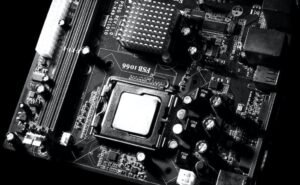Artificial Intelligence: Yay or Nay?
Artificial Intelligence (AI) has become an increasingly important topic in today’s rapidly evolving technological landscape.
With its potential to revolutionize industries and impact every aspect of our lives, it sparks both excitement and concerns among individuals and society as a whole.
So, is AI something we should embrace or be wary of? Let’s explore the pros and cons of this emerging technology.
Key Takeaways
- AI holds immense potential to transform industries and improve efficiency.
- It also raises ethical concerns and challenges related to privacy and job displacement.
- Understanding the limitations and responsible implementation of AI is crucial.
The Pros of Artificial Intelligence
*Artificial Intelligence holds numerous benefits in a variety of fields.
One of the key advantages is its capability to process and analyze vast amounts of data at unprecedented speed, enabling organizations to make data-driven decisions and solve complex problems efficiently.
Additionally, AI-powered automation can enhance productivity by reducing repetitive tasks and boosting accuracy, leading to better efficiency and cost savings.
The potential applications of AI span across industries, from healthcare and finance to transportation and beyond, revolutionizing the way we live and work.
The Cons of Artificial Intelligence
*While the benefits of AI are impressive, there are also drawbacks and ethical concerns that need careful consideration.
Privacy is a major issue as the utilization of AI often involves collecting and analyzing personal data, raising concerns about data security and potential misuse.
The displacement of jobs is another concern, as automation and AI technologies have the potential to replace human workers in certain roles, leading to unemployment and economic inequality.
Additionally, there are ethical dilemmas surrounding AI, such as decision-making algorithms that can inadvertently perpetuate biases or make unethical choices if not properly designed and monitored.
AI Use Cases and Impact
*Let’s explore some real-world applications and the impact of AI:
| Industry | Use Case |
|---|---|
| Healthcare | AI-powered diagnosis and treatment recommendation systems |
| Finance | Automated fraud detection and personalized investment recommendations |
| Transportation | Self-driving cars and traffic optimization systems |
*The impact of AI can be seen in various sectors. For example, in healthcare, AI helps in diagnosing diseases more accurately and suggesting personalized treatment plans.
In finance, AI algorithms enhance fraud detection methods and provide tailored investment advice based on individual preferences and risk profiles.
In the transportation industry, self-driving cars and AI-powered traffic optimization systems aim to improve road safety and reduce congestion.
These are just a few examples of how AI is revolutionizing different sectors.
Challenges and Responsible AI Development
*As AI continues to advance, it is crucial to address the challenges and ensure responsible development and deployment.
Ensuring data privacy and security by implementing robust measures to protect personal information is essential.
Promoting transparency in AI systems is also important, enabling users to understand how decisions are made and mitigating potential biases.
Additionally, investing in continuous learning and upskilling programs can help individuals adapt to the changing job landscape and remain relevant amidst automation.
Responsible AI development involves active collaboration between policymakers, industry leaders, and society as a whole.
The Future of AI
*The future of AI looks promising, but it also requires careful management to address the challenges it presents.
Striking a balance between innovation and responsibility is essential to maximize the benefits of AI while minimizing potential risks.
As AI evolves, it will become increasingly important to ensure that advances in technology align with societal values and that the potential downsides are addressed proactively.
By leveraging AI’s potential while being mindful of its limitations, we can create a future where artificial intelligence serves as a powerful tool for progress, benefiting individuals and society at large.

Common Misconceptions
1. AI is a threat to humanity
One common misconception about artificial intelligence is that it is a threat to humanity, with the potential to take over the world and dominate humans. However, this is not entirely true.
- AI technology is designed to assist humans, not replace them.
- AI systems require human input to function effectively.
- Ethical guidelines are being developed to ensure that AI is used responsibly and for the benefit of society.
2. AI will lead to widespread unemployment
Another misconception is that the rise of AI will result in widespread unemployment, as it will replace human workers in various industries. However, this assumption oversimplifies the impact of AI on the job market.
- AI can complement human skills and enhance productivity, leading to the creation of new jobs.
- While certain job roles may be automated, AI will also create demand for new skill sets in managing and developing AI technology.
- The integration of AI into industries can lead to job transformation rather than complete job elimination.
3. AI is only useful for the tech industry
Many people believe that artificial intelligence is only relevant or useful in the tech industry, which is not accurate. AI has the potential to impact a wide range of sectors, extending far beyond technology.
- AI can be applied in healthcare to improve patient diagnosis and treatment options.
- In finance, AI algorithms can help with fraud detection and financial analysis.
- In transportation, AI technologies can be used to develop self-driving vehicles, reducing accidents and traffic congestion.
4. AI is a flawless and unbiased decision-maker
Some mistakenly perceive AI as infallible decision-makers, assuming that AI systems are always objective and free from biases. However, AI models are created by humans and can inherit their biases.
- AI algorithms can perpetuate societal biases if the training data used is biased or flawed.
- It is essential to ensure the responsible development and training of AI systems to minimize biased decision-making.
- Ongoing research aims to address the challenge of fair and unbiased AI implementation.
5. AI will lead to loss of privacy and control
There is a concern that AI will erode privacy and personal control, with AI systems monitoring and collecting vast amounts of personal data. However, this fear is not entirely true.
- There are regulations and guidelines in place, such as the General Data Protection Regulation (GDPR), to safeguard individuals’ privacy rights regarding AI and data usage.
- Transparency and accountability are vital in AI development to ensure user control and consent regarding data collection and usage.
- People can make informed choices and set boundaries to maintain their privacy in the era of AI.

An Overview of Artificial Intelligence
Artificial Intelligence (AI) is an ever-evolving technological field that aims to develop intelligent machines capable of performing tasks that typically require human intelligence. The advent of AI has sparked debates regarding its potential benefits and drawbacks. This article presents a collection of fascinating tables to highlight various aspects of AI.
The Impact of AI on Employment
With the rise of AI, concerns arose about its impact on employment. The table below illustrates the projected job displacement in five major industries by 2030.
| Industry | Projected Job Displacement |
|---|---|
| Manufacturing | 20% |
| Transportation | 15% |
| Healthcare | 10% |
| Finance | 8% |
| Retail | 5% |
AI and Medical Diagnosis
Artificial Intelligence has made significant advancements in the medical field, particularly in diagnosis. The next table compares the accuracy of AI systems and human doctors in detecting specific diseases.
| Disease | AI Accuracy (%) | Human Doctor Accuracy (%) |
|---|---|---|
| Lung Cancer | 94% | 68% |
| Diabetes | 87% | 82% |
| Alzheimer’s | 91% | 76% |
| Parkinson’s | 82% | 67% |
AI and Social Media
The pervasive influence of AI is evident in social media. The table below showcases the number of daily active users on popular platforms.
| Platform | Daily Active Users |
|---|---|
| 1.82 billion | |
| 500 million | |
| 330 million | |
| 260 million |
The Future of AI in Transportation
AI’s integration in the transportation sector forecasts promising developments. The following table exhibits the estimated adoption rates of autonomous vehicles in the coming years.
| Year | Estimated Adoption Rate |
|---|---|
| 2022 | 3% |
| 2025 | 10% |
| 2030 | 25% |
| 2040 | 70% |
AI in Film Industry
AI has started revolutionizing the film industry, as showcased in the table highlighting films generated by AI.
| Film Title | AI Involved |
|---|---|
| Morgan | Movie Trailer |
| Ben and Sarah: A Robotic Horror Film | Entire Film |
Language Translation Accuracy
Language translation has greatly benefited from AI advancements. This table exhibits the accuracy of different translation systems.
| Language Pairs | AI Translation Accuracy (%) |
|---|---|
| English-Spanish | 97% |
| French-German | 92% |
| Japanese-English | 88% |
| Chinese-Russian | 83% |
Ethical Considerations in AI
AI’s ethical implications fuel discussions globally. The next table highlights ethical dilemmas surrounding AI.
| Ethical Dilemma | Concern Level (1-10) |
|---|---|
| Privacy Invasion | 9 |
| Job Displacement | 8 |
| Autonomous Weapons | 7 |
| Algorithmic Bias | 6 |
The Rise of AI Startups
The AI industry has witnessed a surge in startup companies. The next table presents the top AI startup funding rounds.
| Startup Name | Funding Amount |
|---|---|
| OpenAI | $1 billion |
| UiPath | $750 million |
| Horizon Robotics | $600 million |
| Graphcore | $385 million |
Conclusion
Artificial Intelligence stimulates both enthusiasm and apprehension. Its implications encompass a wide range of sectors, from employment and healthcare to social media and transportation. While AI presents opportunities for improved efficiency and accuracy, it also raises concerns about privacy and job displacement. As AI continues to evolve, society must navigate the ethical complexities surrounding its development and applications. Understanding the potential of AI is crucial for ensuring its responsible and beneficial integration into our lives.
Frequently Asked Questions
What is Artificial Intelligence?
Artificial Intelligence (AI) refers to the development of computer systems that can perform tasks that would typically require human intelligence. These tasks can include problem-solving, decision-making, speech recognition, and learning.
How does Artificial Intelligence work?
AI systems work by processing vast amounts of data and using complex algorithms to recognize patterns, make predictions, and provide solutions based on the input data. They often employ machine learning techniques, including deep learning, to continuously improve their performance over time.
What are the potential benefits of Artificial Intelligence?
AI has the potential to revolutionize various fields and industries, such as healthcare, transportation, finance, and manufacturing. It can enhance efficiency, accuracy, and productivity, automate repetitive tasks, provide valuable insights from large datasets, and contribute to scientific advancements.
What are the ethical concerns surrounding Artificial Intelligence?
AI raises ethical concerns related to privacy, security, bias, and accountability. There are concerns about the misuse of AI technology, disproportionate impact on certain groups, potential job displacement, and the lack of transparency in decision-making processes of AI algorithms.
What are some examples of current AI applications?
Current AI applications include virtual assistants like Siri and Alexa, image and speech recognition systems, recommendation systems used by online platforms, autonomous vehicles, fraud detection algorithms, and medical diagnostic tools.
Can Artificial Intelligence replace human workers?
AI has the potential to automate certain tasks and jobs, leading to workforce transformation. While some jobs may be replaced by AI, new jobs may also be created, and humans will still be required to perform tasks that require complex decision-making, creativity, empathy, and social interaction.
How can we ensure that Artificial Intelligence is used responsibly?
Responsible use of AI involves developing robust ethical frameworks, ensuring transparency and accountability in AI systems, addressing biases in datasets, involving multiple stakeholders in decision-making processes, and promoting ongoing monitoring and evaluation of AI systems.
What are the limitations of Artificial Intelligence?
AI systems may struggle with understanding context, lack common sense reasoning, and require vast amounts of high-quality data to learn effectively. They may also be susceptible to errors, biases, and manipulation. Additionally, ethical concerns and regulations may limit the full potential of AI.
How can individuals prepare for the impact of Artificial Intelligence?
Individuals can prepare for the impact of AI by developing new skills that complement AI technology, such as critical thinking, creativity, problem-solving, and emotional intelligence. Continuous learning, adaptability, and staying updated with technological advancements are also crucial.
What is the future of Artificial Intelligence?
The future of AI holds tremendous potential for advancements in various domains, including healthcare, robotics, transportation, and education. It is expected to continue evolving, with improved capabilities, increased integration into our daily lives, and ongoing discussions about its ethical and societal implications.




